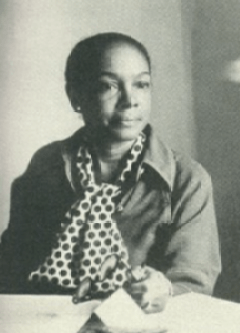
Mamie Phipps Clark (1917-1983) was not only the first Black woman to earn a PhD from Columbia University, she made history as social psychologist when she helped outlaw segregation in schools.
Clark was born in Hot Spring, Arkansas during the Great Depression on April 18, 1917. Her father was a physician and her mother was a homemaker. But, this was also the Jim Crow south, where her entire educational experience was segregated until she entered Columbia University for her doctorate studies.
At age 17 Clark graduated from high school. She was a bright, hard working student that loved school. She was offered several scholarships, including offers from two of the most prestigious Black universities in the country – Fisk University in Tennessee and Howard University in Washington D.C. She chose to attend Howard University.

In 1939 Clark graduated magna cum laude from Howard University, and immediately enrolled in the psychology graduate program. Her focus was on children and race identity. Clark’s research found that segregated public schools were having a negative impact on the self esteem and development of Black children.
After earning her masters degree in psychology, Mamie and Kenneth Clark (her husband) moved to New York City where they both enrolled in the psychology doctorate program at Columbia University. Mamie Phipps Clark became the first Black woman to earn a doctorate at Columbia University in 1943.
Clark’s most famous work, the “Dolls Test”, assessed the racial preferences of young children in segregated schools. This was primarily Mamie Clark’s project, an extension of her thesis work. The test used identical dolls, differing only in hair and skin color. The children were asked a series a questions about the dolls, the experiment found that Black children had favorable ideas about white dolls, and negative ideas about the Black dolls. These results fueled their growing sense of urgency around the fight against segregation.
Clark’s research on the effects of segregation on Black children played a very important role in the legal push to desegregate schools. She testified as an expert witness in front of the Supreme Court in the Brown v. Board of Education trial in 1954. The “Doll Test” was submitted as evidence in support of the Brown case. The findings indicated that segregation promoted prejudice and produced negative effects in Black children. Mamie Phipps Clark showed strength and courage when she was called upon to refute false claims in court made by her former thesis supervisor about the inferiority of Black children.

Her testimony, knowledge, research and experience helped strike down ‘separate but equal’, American public schools were ordered to integrate. While the laws around public education have changed, we must continue to push for true equality in education and beyond. Today we honor Mamie Phipps Clark for her persistence, intelligence and passion, She Made History.
Links For Learning:
Mamie Katherine Phipps Clark (1917–1983) – Encyclopedia of Arkansas
How a Psychologist’s Work on Race Identity Helped Overturn School Segregation in 1950s America – Smithsonian Magazine
